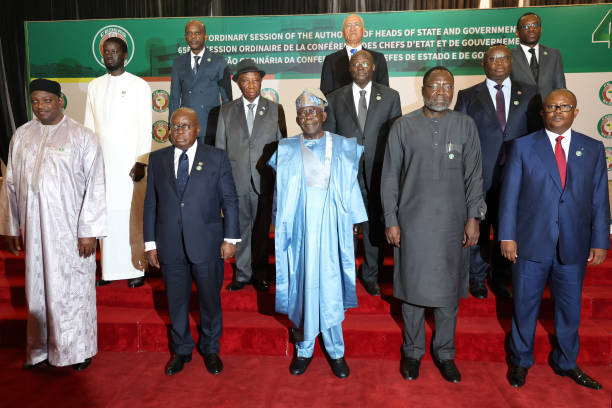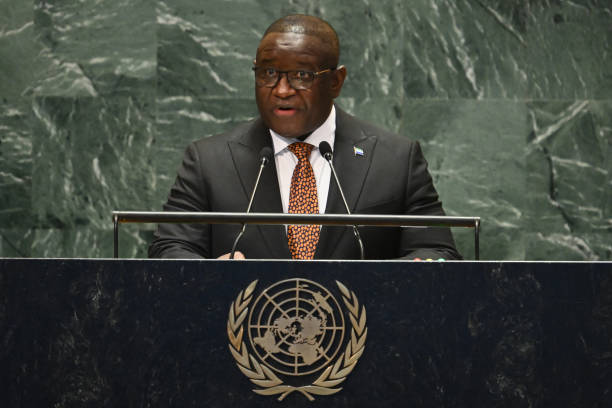During his ongoing tour of West Africa, Sierra Leone’s president, Julius Maada Bio, renewed his call for the Alliance of Sahel States (AES) to return to the Economic Community of West African States (ECOWAS). Bio, who assumed ECOWAS’s rotating chair in June, said his personal ties with leaders in Mali, Burkina Faso, and Niger could help rebuild bridges.
The three military-led governments announced in January that they were leaving the 15-member bloc after creating their own Sahel-focused alliance last year. Their split followed ECOWAS pressure on Niger to restore civilian rule after the country’s 2023 coup.
Bio framed the moment as critical for West Africa, citing the compound threats of jihadist violence, climate stress, repeated coups, and entrenched poverty. He pledged to use his tenure to reinforce democratic norms, strengthen regional security cooperation, deepen economic integration, and bolster ECOWAS’s institutional credibility.

Analysis
Why Bio is pushing now
- Leverage of the chair: As ECOWAS chair, Bio can convene talks, shape agendas, and mobilize member states around incentives (e.g., sanctions relief timelines, security coordination, trade facilitation).
- Crisis convergence: Security degradation in the Sahel, food-price pressures, and climate shocks make fragmentation costlier—for both ECOWAS and the AES trio—creating a window for pragmatic deals.
What each side wants
AES (Mali, Burkina Faso, Niger):
- Respect for their transition timelines and reduced external pressure on domestic politics.
- Security cooperation that acknowledges their frontline role against insurgencies.
- Access to regional markets, corridors, and financial systems without heavy political conditionality.
- ECOWAS under Bio:
- Credible movement back toward constitutional order to protect the bloc’s anti-coup norm.
- Reconnected security architecture to prevent cross-border militant safe havens.
- A reputation rebound after past sanctions drew criticism for hurting civilians more than juntas.
Likely bargaining chips
- Phased reintegration: Sequencing steps—e.g., restoring some trade and travel privileges in exchange for concrete transition benchmarks (electoral roadmaps, amnesties, or power-sharing guarantees).
- Security-first bridges: Joint border operations, intel-sharing, and deconfliction cells that can be set up even before full political reintegration.
- Economic sweeteners: Development finance, climate adaptation support, and infrastructure linkages (transport and energy) that benefit the Sahel and coastal states alike.
Constraints and risks
- Credibility dilemma: ECOWAS must avoid signaling that coups bring better terms; the AES leaders must avoid looking like they conceded sovereignty. Any deal will need face-saving measures on both sides.
- Domestic politics: Hardline constituencies—within both ECOWAS democracies and the AES regimes—may resist compromise, especially around election timelines or sanctions relief.
- Security spillovers: If coordination lags, militants exploit seams at borders; a prolonged split could deepen the “two-speed” regional order.
Strategic context
- External partners: Competition among outside powers for security partnerships and mining concessions raises the stakes. Both ECOWAS and AES will try to diversify backers while avoiding overdependence.
- Climate and livelihoods: Desertification and extreme weather intensify pastoralist–farmer tensions and displacement; security fixes alone won’t stabilize the Sahel without rural investment and climate adaptation.
Scenarios ahead
- Re-engagement lite (most plausible near term): Partial restoration of ECOWAS benefits (trade, mobility) tied to specific governance steps; robust security coordination resumes even if political reintegration lags.
- Hybrid architecture: AES keeps its alliance but signs standardized MOUs with ECOWAS on security and trade—a “two-layer” system that manages rivalry and cooperation simultaneously.
- Stalemate and fragmentation: No compromise; parallel institutions harden, cross-border attacks rise, and costs mount for landlocked economies.
Indicators to watch
- Announcements of sequenced roadmaps: e.g., timelines for transitions matched with staged lifting of restrictions.
- Creation of joint security mechanisms: border task forces, hotlines, or shared operations centers.
- Movement on trade and mobility: reopening of key corridors, recognition of customs/transit documents.
- Rhetorical shifts: from zero-sum language to technical, problem-solving communiqués.
- Civil society and business buy-in: chambers of commerce, transport unions, and religious leaders endorsing compromise.
Bottom line: Bio is betting that regional unity can be rebuilt through a mix of pragmatism and principle—offering the AES states real economic and security gains while preserving ECOWAS’s core democratic standards. Success likely hinges on phased, verifiable steps that deliver quick wins at borders and markets, while keeping longer-term political normalization on track.



